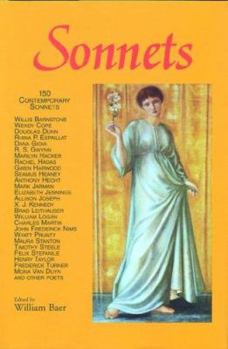Sonnets: 150 Contemporary Sonnets
No Synopsis Available.
Format:Hardcover
Language:English
ISBN:0930982592
ISBN13:9780930982591
Release Date:January 2005
Publisher:University of Evansville Press
Length:176 Pages
Weight:1.00 lbs.
Customer Reviews
4 ratings
A Pleasing Contemporary Collection
Published by Thriftbooks.com User , 14 years ago
I came upon this wide ranging anthology when reseaching my Sonnets for Sinners: Everything One Needs to Know About Illicit Love. A fine collection, a little uneven perhaps, but with some quite outstanding sonnets, nonetheless. In all, a very enjoyable read of accessible modern poetry that mirrors our time.
Excellent editing for an excellent contemporary collection
Published by Thriftbooks.com User , 16 years ago
For fans of "The Formalist," which in my opinion was the best journal of metrical verse for the fifteen years that it ran, this collection is simply a must. Baer is a tough editor who knows the sonnet inside and out. The reward of that, for readers, is that they will not encounter a flimsy, or trite, poem within this book. Readers unfamiliar with the nuances of metrical substitution for effect might criticize Baer's choices; that is certainly their right. But for this reader, "150 Sonnets" stands as a truly superior testimony to the power of the traditional, rhymed sonnet as a valid, current form used by highly skilled poets today. I agree with other reviewers that this is not the book to turn to if you are looking for the latest in avant-garde sonnets, or FOR the most comprehensive history of sonnets. But this is the book to buy if you simply want to savor 150 great sonnets handpicked by a superior editor. Highly recommended!
Not bad--a bit narrow in focus
Published by Thriftbooks.com User , 16 years ago
This little anthology fills a gap in the current literature about the sonnet. While other anthologies such as The Oxford Book of Sonnets (Fuller, ed.) and The Penguin Book of the Sonnet (Levin, ed.) provide an overview of five centuries of sonnet-writing in English, and other anthologies such as Strong Measures (Darcy & Jauss, eds.), Rebel Angels (Jarman & Mason, eds.) and A Formal Feeling Comes (Annie Finch, ed.) provide an overview of modern formalist verse in general, Baer's anthology is the only collection specifically dedicated to the modern sonnet. The anthology, however, should not be seen as comprehensive or even representative of modern sonneteering as a whole. Rather, it represents the poets of what can only be described as the "Evansville School." William Baer, the editor of this anthology, is the former editor of the now defunct journal, The Formalist, based out the University of Evansville. The overwhelming majority of the sonnets in this collection appeared within the pages of that journal between 1990 and 2005 and represent the editor's favorite sonnets. The anthology is published by the University of Evansville press. I would describe the Evansville style as characterized by conservative subject matter and style. With few exceptions, the poems are in strict, traditionally rhymed formats--Shakespearean and Petrarchan--with solid rhymes and fairly tight meter. This is in no way intended to disparage this fine anthology. Some of the biggest, most talented poets who have written sonnets in the past few decades are represented in this collection: Wendy Cope, Alfred Dorn, Rhina Espaillat, Dana Gioia, R.S. Gwynn, Marilyn Hacker, Rachel Hadas, Seamus Heaney, Anthony Hecht, Mark Jarman, X.J. Kennedy, Marion Shore, A.E. Stallings, Felix Stephanile and Richard Wilbur to name a few (unfortunately, I cannot credit all the writers who appear herein, many of whom are my acquaintances). But do note that the field of modern sonnetry is a broad one and this anthology does not represent the efforts of more experimental, avant garde or post-modernist writers who are working in the form. The anthology contains an appendix, which provides an appropriately brief overview of the history of the sonnet from its origins in 13th Century Sicily to modern times. For those desiring a more comprehensive evaluation of the structure and history of the sonnet, Baer's appendix falls far short of the introduction contained in the U.S. edition of Phillis Levin's The Penguin Book of the Sonnet. In short, the book is a nice addition to the bookshelf of anyone interested in the modern sonnet. It should not, however, been seen as comprehensive or representative of modern sonneteering as a whole.
Return of the Sonnet
Published by Thriftbooks.com User , 19 years ago
The "Introduction" and the "A Brief History of the Sonnet" by William Baer were outstanding. The magnificent sonnet titled "Candle" by Jerry H. Jenkins alone is worth the price of the book.






